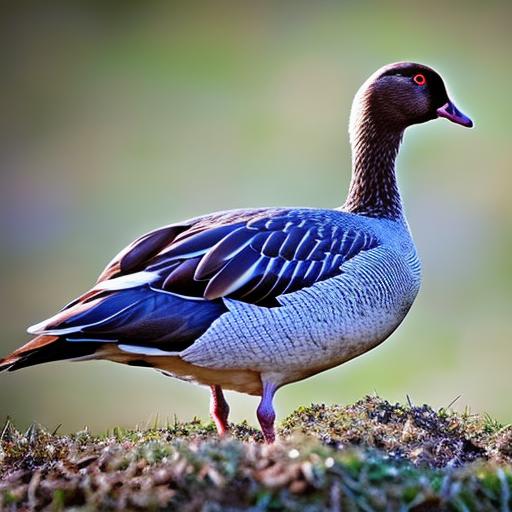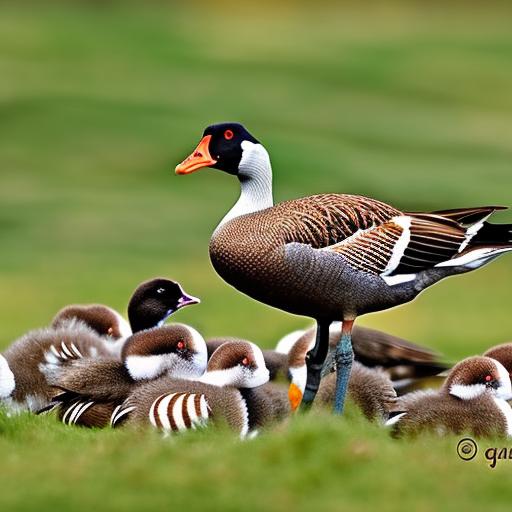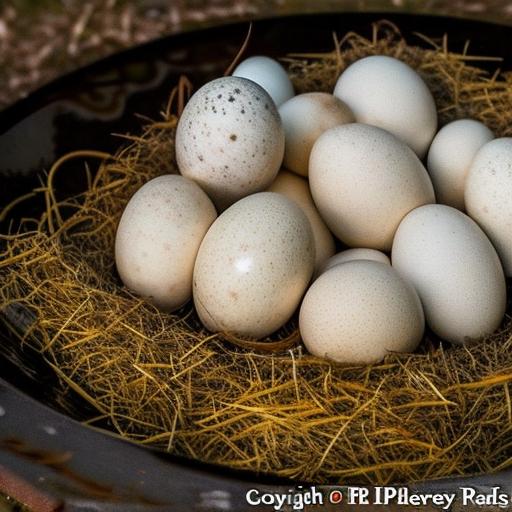Geese have been used for egg production for centuries, with records dating back to ancient Egypt and Rome. These birds are known for their large eggs, rich in nutrients and flavor. Raising geese for egg production has several advantages, making it a popular choice for farmers and homesteaders.
One of the main advantages of raising geese for egg production is their high egg-laying capabilities. Geese are known to lay a large number of eggs compared to other poultry birds. They are also excellent foragers, which means they can find a significant portion of their own food, reducing feed costs. Additionally, geese are hardy birds that can adapt to various climates and environments, making them suitable for different regions.
Key Takeaways
- Geese are a great option for egg production due to their high egg-laying capacity and low maintenance requirements.
- The top breeds of geese for egg laying include Toulouse, Embden, and Chinese geese.
- Understanding the characteristics of geese breeds is important when choosing the right breed for egg production, including egg-laying capacity, temperament, and size.
- When choosing a breed of geese for egg production, consider factors such as climate, available space, and personal preferences.
- Raising geese for egg production has benefits such as a sustainable source of protein and potential for profit, but also comes with challenges such as predator control and proper housing and feeding.
Top Breeds of Geese for Egg Laying
There are several breeds of geese that are well-known for their egg-laying capabilities. The most popular breeds include the Toulouse, Embden, and Chinese geese.
The Toulouse goose is a large breed known for its excellent egg-laying abilities. They can lay up to 40-60 eggs per year and have a calm and friendly temperament. The Embden goose is another popular breed known for its high egg production. They can lay up to 35-45 eggs per year and are also known for their size and meat quality. The Chinese goose is a smaller breed but is highly regarded for its egg-laying capabilities. They can lay up to 50-60 eggs per year and are known for their alert and active nature.
Understanding the Characteristics of Geese Breeds for Egg Production
When choosing a breed of geese for egg production, there are several factors to consider. One important factor is the temperament of the breed. Some geese breeds are known to be more docile and friendly, while others may be more aggressive or territorial. It is important to choose a breed that suits your needs and preferences.
Size is another characteristic to consider. Some breeds, like the Toulouse and Embden geese, are larger in size and may require more space and resources. Smaller breeds, like the Chinese goose, may be more suitable for those with limited space or resources.
Other characteristics that can affect egg production include the age of the geese, their diet, and the overall health of the birds. It is important to provide proper nutrition and care to ensure optimal egg production.
How to Choose the Right Breed of Geese for Egg Production
When choosing a breed of geese for egg production, it is important to consider your specific needs and goals. If you are looking for high egg production, breeds like the Toulouse or Chinese geese may be a good choice. If you are also interested in meat production, breeds like the Embden goose may be more suitable.
It is also important to choose a reputable breeder or supplier when purchasing geese for egg production. Look for breeders who have a good reputation and can provide you with healthy and well-cared-for birds. Ask for references or visit the breeder’s farm to see how the geese are raised.
The Benefits of Raising Geese for Egg Production
Raising geese for egg production has several benefits. One of the main benefits is the health benefits of geese eggs. Geese eggs are known to be rich in nutrients, including vitamins A, B12, and D, as well as minerals like iron and selenium. They are also lower in cholesterol compared to chicken eggs.
Another benefit of raising geese for egg production is the environmental impact. Geese are excellent foragers and can find a significant portion of their own food, reducing the need for commercial feed. They also produce less waste compared to other poultry birds, making them more environmentally friendly.
The Challenges of Raising Geese for Egg Production

While there are many benefits to raising geese for egg production, there are also some challenges that farmers may face. One common challenge is the aggression of some geese breeds. Geese can be territorial and may become aggressive towards humans or other animals. It is important to handle geese with care and provide them with proper training and socialization.
Another challenge is the need for adequate space and resources. Geese require a large area to roam and graze, as well as access to water for swimming and bathing. They also need shelter and protection from predators. It is important to provide a suitable environment for geese to ensure their health and well-being.
Feeding and Housing Geese for Optimal Egg Production
To ensure optimal egg production, it is important to provide geese with a balanced diet and suitable housing. Geese should have access to fresh water at all times, as well as a variety of grasses, grains, and vegetables. Commercial poultry feed can also be provided to supplement their diet.
Geese should be housed in a secure and spacious enclosure that provides protection from predators and the elements. The enclosure should have access to water for swimming and bathing, as well as shelter for nesting and resting.
Geese Egg Production: How Many Eggs to Expect
The average egg production rates for different breeds of geese can vary. Toulouse geese can lay up to 40-60 eggs per year, while Embden geese can lay up to 35-45 eggs per year. Chinese geese have the highest egg production rates, with up to 50-60 eggs per year.
It is important to note that these are average egg production rates and individual geese may lay more or fewer eggs depending on various factors such as age, health, and diet.
Geese Egg Collection and Handling
When collecting geese eggs, it is important to handle them with care to ensure their freshness and quality. Geese eggs should be collected daily to prevent them from becoming dirty or damaged. They should be stored in a cool and dry place, away from direct sunlight.
To clean geese eggs, use a soft cloth or brush to remove any dirt or debris. Avoid using water or soap, as this can remove the natural protective coating on the eggs.
Selling Geese Eggs: Marketing Strategies and Best Practices
When selling geese eggs, it is important to have a marketing strategy in place to attract customers. Consider selling directly to consumers through farmers markets, online platforms, or local stores. You can also consider offering value-added products such as pickled or deviled geese eggs to attract a wider range of customers.
When packaging geese eggs, use clean and sturdy cartons that protect the eggs from damage during transportation. Label the cartons with the date of collection and any relevant information about the eggs.
Raising geese for egg production can be a rewarding venture for farmers and homesteaders. Geese are known for their high egg-laying capabilities and their ability to adapt to various climates and environments. By choosing the right breed, providing proper care and nutrition, and implementing best practices for egg collection and handling, farmers can enjoy the benefits of geese egg production. However, it is important to be aware of the challenges that may arise and take steps to overcome them. With proper planning and management, raising geese for egg production can be a profitable and fulfilling endeavor.
If you’re interested in learning more about breeds of geese specifically for their egg-laying capabilities, you might find this article on “How Many Eggs Do Geese Lay?” quite informative. It discusses the different breeds of geese and their egg production potential. From the popular Toulouse to the prolific Chinese breed, this article provides valuable insights into the number of eggs you can expect from each breed. To delve deeper into the world of poultry breeding, you may also want to check out “The Chicken Coop Country Diner,” a delightful piece that explores the importance of a well-designed chicken coop in ensuring healthy and happy hens.
FAQs
What are the best breeds of geese for egg production?
The best breeds of geese for egg production are the Chinese, Toulouse, and Embden geese.
How many eggs can a goose lay in a year?
A goose can lay up to 50-60 eggs in a year, depending on the breed and the individual bird.
What is the size of eggs laid by geese?
The size of eggs laid by geese varies depending on the breed, but they are generally larger than chicken eggs and can range from medium to extra-large.
At what age do geese start laying eggs?
Geese typically start laying eggs at around 6-8 months of age, although this can vary depending on the breed and individual bird.
How long do geese continue to lay eggs?
Geese can continue to lay eggs for several years, with peak egg production occurring in the first 2-3 years of their life.
What is the nutritional value of goose eggs?
Goose eggs are high in protein, vitamins, and minerals, and are a good source of choline, which is important for brain health.
Can goose eggs be used in cooking?
Yes, goose eggs can be used in cooking and baking just like chicken eggs, although they may require longer cooking times due to their larger size.
Meet Walter, the feathered-friend fanatic of Florida! Nestled in the sunshine state, Walter struts through life with his feathered companions, clucking his way to happiness. With a coop that’s fancier than a five-star hotel, he’s the Don Juan of the chicken world. When he’s not teaching his hens to do the cha-cha, you’ll find him in a heated debate with his prized rooster, Sir Clucks-a-Lot. Walter’s poultry passion is no yolk; he’s the sunny-side-up guy you never knew you needed in your flock of friends!







